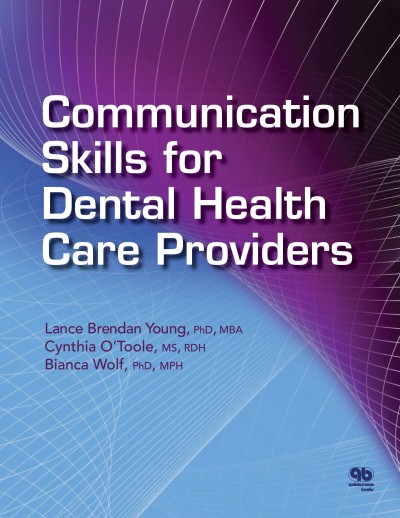University of Puget Sound’s Bianca Wolf co-writes new book with Brendan Young and Cynthia O’Toole
TACOMA, Wash. – It is not always easy for patients to talk to their doctors or dentists about personal issues that affect their health. Dental patients, especially, may think it unnecessary to talk to about smoking, eating disorders, substance abuse, and even partner violence. Yet a dentist needs to know these things, in order to help patients maintain their teeth and gums—and their pride in their appearance.
From a dental care provider’s perspective, it can be even harder to raise personal issues. The patient’s reaction could be cold, embarrassed, or hostile, and possibly cost that office a client. However dentists increasingly agree that addressing such issues costs them to meet a patient’s dental needs.
The new book, Communication Skills for Dental Health Care Providers (Quintessence Publishing; 2015), aims to help dentists, dental hygienists, and others in the profession open those Iines of communication. It is co-authored by Bianca Wolf, associate professor in communication studies, University of Puget Sound, Brendan Young, assistant professor of communication at Western Illinois University, and Cynthia O’Toole, clinical assistant professor at The University of Iowa College of Dentistry & Dental Clinics.
“The common perception by dentists is that patients will conceal their behavioral health problems or react negatively to a clinician who asks about them,” Young said. “So dentists usually don’t ask or don’t follow up adequately and persistently any indicators on health history forms of behavioral health problems. The evidence, however, overwhelmingly indicates that patients do want clinicians to ask about behavioral health problems.”
Using researched evidence, the new guide offers practical strategies to improve patient-provider communication and explains how to sensitively elicit accurate information during a patient visit. Within its 12 chapters, it outlines how to overcome challenges related to culture, language, age, disability, and social stigma. It instructs dental practitioners in ways to enhance listening, verbal, and nonverbal communication skills. The book also covers how to interact during and after dental procedures and the best way to present preventive and restorative treatment plans to the patient.
“Having worked closely with health faculty and students for many years, we have found that, more often than not, dental professionals are eager to engage in ethical, efficient, and health-promoting patient interactions,” Wolf said. “Yet, they may not be fully prepared for all of the communicative challenges they will face throughout their careers.”
The authors decided to write the book after teaching communication to dental students and finding a lack of up-to-date resources beyond materials based primarily on anecdotal or “learned-on-the-job” advice from dental professionals. They decided to create a book that could be used both as a text for student education and as a resource for seasoned dental professionals.
“Even though we see many positive communication behaviors among dentists, staff, and patients, it is easy for practitioners to focus on what strikes them as negative or what could be improved,” O’Toole said. “Seldom is the feedback constructive or even voiced, and, ultimately, the patient’s reaction is evidenced by broken appointments, lack of adherence to treatment recommendations, or deciding to seek care elsewhere.”
The authors found evidence that even though a patient may seem reluctant to talk about issues such as giving up tobacco at one appointment, they could be willing to consider it six months later. So dentists need to keep asking questions. Young believes many dentists may be surprised to find that patients actually welcome their concern and how their persistence often yields results.
Communication Skills for Dental Health Care Providers are available in hard copy and electronic formats at online retailers and the publisher’s website.
Lance Brendan Young, Ph.D., M.B.A., is an assistant professor of communication at Western Illinois University and has taught at The University of Iowa College of Dentistry. He earned a Master of Business Administration degree from Tulane University. He worked in marketing for 14 years before earning a doctorate in communication studies, emphasizing health communication, at The University of Iowa, and completing a two-year postdoctoral fellowship with the Veterans Health Administration. His research has appeared in the Archives of Internal Medicine, Culture and Psychology, Journal of Gerontological Nursing, and Journal of Telemedicine and Telecare.
Cynthia Rozek O’Toole, M.S., R.D.H., has worked at The University of Iowa College of Dentistry for 29 years. In addition to her clinical duties, she has taught the communication curriculum to dental students. She contributed to the development of the curriculum for first- and second-year students and redesigned the standardized patient curriculum for third-year students. O’Toole has secured several grants to implement innovative curricular enhancements. These have included introducing new technology, such as videotaping patient interactions and initiating diversity training to enhance communication with diverse patients, such as Hispanic or hard-of-hearing clients.
Bianca Wolf, Ph.D., M.P.H., is an associate professor of communication studies at the University of Puget Sound. She worked for 12 years in health insurance, medical software and practice management, and corporate education. She earned a doctorate in communication studies with an emphasis in health care and a Master of Public Health degree from The University of Iowa. Wolf taught at The University of Iowa College of Dentistry and redesigned a patient-provider curriculum. Her research on patient communication has been presented nationally and internationally and has appeared in Qualitative Health Research, Journal of Social and Personal Relationships, and Journal of Family Communication.
For a copy of the book, visit: quintpub.com/display_detail.php3?psku=B6904#.VjpVtKPTkdU
Press photos of the book cover are available upon request.
Photos on page: Top right: Dentist and assistant in England, 2009 by Erik Christensen; Above: Book cover.
Tweet this: Dentists: Talk to your patients! New book by B. Wolf @univpugetsound B. Young @WesternILUniv C. O’Toole @uicod #dental #communication http://bit.ly/1Ys6Uvc
Follow us on Twitter! twitter.com/univpugetsound



